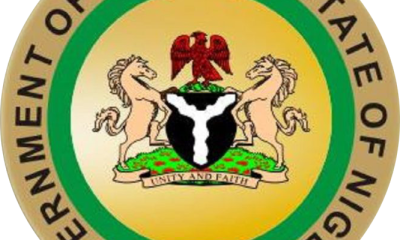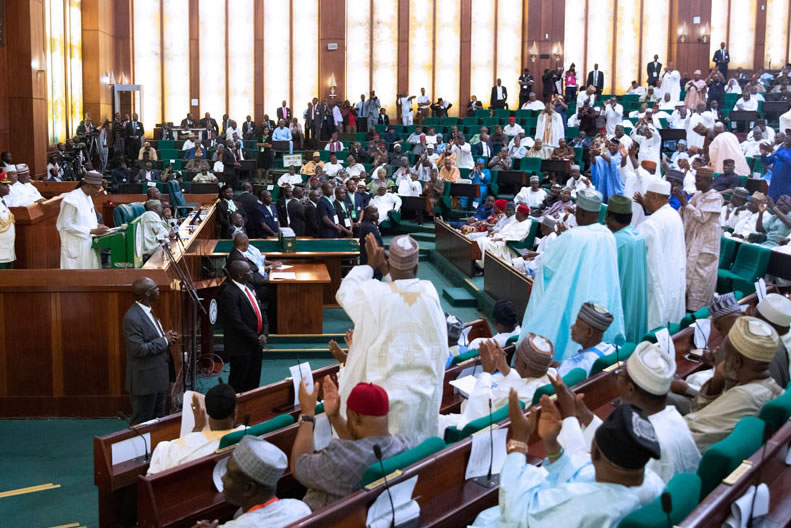Agriculture
Why CBN is Funding Large Scale Cassava Production – Emefiele

By Tony Obiechina, Abuja
The Governor of the Central Bank of Nigeria(CBN), Mr Godwin Emefiele said on Thursday, that the Bank decided to fund large scale production of cassava because it has the potential for employing over two million Nigerians.
Emefiele spoke at a meeting with State Governors of Cassava Producing States and Signing of the Memorandum of Understanding between Nigeria Cassava Growers Association and Large Scale Cassava Processors at the corporate headquarters of the CBN in Abuja.
“We place a high premium on cassava because the commodity can generally be used for different things along the value chain. The value chain has enormous potential for employing over 2 million people in Nigeria if well harnessed, due to the diverse secondary products that it offers.
“Some of the products include High Quality Cassava Flour (HQCF), Starch, Sugar Syrups & Sweeteners, Chips for domestic livestock feed and for export to China, Ethanol/bio-fuels, High Fructose Cassava Syrup (HFCS), Fuel Ethanol (E10) as well as Animal Feed from cassava waste among others”.
The Governor stated that there were large corporations like Nestle, Flour mills, Promasidor, Unilever which require the secondary outputs from cassava such as starch, glucose, sorbitol etc as raw materials for the production of their final products.
According to him, “we also have the companies whose responsibility is the processing of cassava to starch, glucose, ethanol etc as well as members of the Cassava farmers association.
“The other very important stakeholder present here today are State Governors and their representatives whose primary responsibility is making land available particularly to our unemployed teaming youths to embrace cassava production and processing in Nigeria.
“Our presence here today is therefore, an indication of our commitment to revitalize cassava production and processing by encouraging private sector investors to participate in the Nigerian economy. Through this initiative, you will agree with me that employment opportunities can be boosted in Nigeria, and industrial output can be accelerated for the good of Nigeria.
“The stakeholders in this gathering have all it takes to positively transform the status of cassava production and processing in Nigeria. I want to confirm in absolute terms the CBNs preparedness to reverse the current trend in line with our commitment to social investment by partnering with the major stakeholders towards developing a blueprint that would facilitate the development of Nigerias cassava value chain on a sustainable basis”.
Emefiele pointed out that the aim of bringing together all stakeholders in the value chain is to agree on a framework for modern production and processing of cassava by ensuring that “we identify and tackle all major challenges in the value chain from seedlings production, land clearing, planting, harvesting, processing, marketing and provision of extension services among others”.
Stressing the importance of cassava as an agricultural commodity the Governor recalled that participants during the Fourth International Cassava Conference held in Cotonou, Benin Republic in June 2018 agreed that cassava is currently the 4th most important food crop in the world, after maize, wheat and rice and is grown on over 24 million hectares in 105 countries in the world with Nigeria as the leading producer.
“Cassava represents one of the most important economic crops in the world. Today, the world market for the commodity is one of the most dynamic with the volume of production and foreign trade growing steadily.
“Nigeria is the largest producer; producing about 53.0 million MT in 2018 but with a very low average yield of about 7.7 MT per hectare as compared to 23.4 MT and 22.2 MT per ha in Indonesia and Thailand respectively.
“Statistics however, show that out of the 53.0 million MT of cassava produced in Nigeria annually; more than 90% is processed into food for human consumption whereas a significant industrial demand exists for the output of processed cassava, primarily as substitute for imported raw materials and semi-finished products.
“We are particularly interested in the cassava value chain because it is in line with President Muhammadu Buharis economic diversification programme for Nigeria.
“This is because economic diversification is an essential tool for national development and we are leaving no stone unturned towards repositioning Nigeria on the map of the world not just as the leading cassava producer but a processor as well.
“Compared with any other country of the world, Nigeria has one of the best climate and land resources to produce and process sufficient cassava; good enough; not only for consumption, but also for industrial use and export as the country enjoys both absolute and comparative advantage in producing the commodity”, he added.
He pointed out that even though the nation was blessed with several varieties of cassava that could be explored to optimum potential, there was need to adopt improved varieties and practices that would guarantee better yield, better processing efficiency, increased profit and improved standard of living for farmers.
He said, to realise this goal, the CBN was holding consultations with the International Institute for Tropical Agriculture (IITA), Ibadan and the National Root Crops Research Institute, Umudike.
He also noted that aside from foreign exchange conservation, increasing cassava production was a necessity as starch, glucose, sorbitol and other products currently being imported proffers no future for the nation in the long-term, in view of the fact that Nigeria imports cassava derivatives valued at over $600m annually.
He said it was on this premise that the CBN included cassava in the FX exclusion list to salvage the industry, encourage farmers to go back to their farms to boost jobs creation and increase output and improve the capacity utilization of our processing companies.
Governors of Ekiti State, Dr Kayode Fayemi, his Ondo state counterpart, and the Deputy Governor of Ogun State attended the meeting.
Agriculture
NCP Approves Repositioning of Agriculture Bank

By Tony Obiechina, Abuja
The National Council on Privatisation (NCP) has given its nod to the recommendations aimed at repositioning the Bank of Agriculture (BOA) to ensure food security for Nigerians.
Chaired by the Vice President, Sen. Kashim Shettima, the NCP approved the recommendations from the committee on BOA during its second meeting of 2024 held on Wednesday, April 24, 2024, at the Presidential Villa Abuja.
In his address at the meeting, the Vice President emphasized the importance of optimizing BOA as part of the administration’s agenda to provide food security for the nation.
He urged the committee to engage professionals with integrity to manage the process effectively.Presenting the committee’s report, the Minister of Finance and Coordinating Minister of the Economy, Mr. Wale Edun, who is also the Vice-chairman of the NCP, highlighted the decision to reposition BOA for efficiency and effectiveness. He expressed confidence that the recommendations would guide the Council in revitalizing the Bank of Agriculture and positioning it globally.
One of the Key recommendations includes upgrading the Bank’s ICT infrastructure to automate processes and ensure accountability.
Recall that in 2023, an 8-member inter-ministerial team was set up by the NCP to review the state of affairs at BOA, given its critical role in agriculture and the administration’s commitment to food security.
Additionally, in 2016, the NCP approved collaboration between the Bureau of Public Enterprises and the Federal Ministry of Agriculture and Rural Development, along with the Federal Ministry of Finance, to restructure and recapitalize BOA.
According to a statement by BPE Head of Public Communications, Amina Tukur Othman on Friday, the BOA, formerly known as Nigeria Agricultural Cooperative and Rural Development Bank, waa established in 1992.
It is owned by the Federal Government of Nigeria (FGN), with the Ministry of Finance Incorporated (MOFI) holding 60% and the Central Bank of Nigeria (CBN) holding 40%. The Bank is supervised by the Federal Ministry of Agriculture and Food Security (FMAFS).
Agriculture
Mrs Soludo Launches Organic Garden Competition in Anambra Secondary Schools

Wife of the Anambra State Governor, Dr Nonye Soludo, on Saturday launched the organic garden competition in secondary schools in Anambra to encourage children to learn more about food and farming.
Soludo, while addressing Healthy Living Teacher Ambassadors in Awka, said the organic garden competition would help teach children the importance of food and farming and its impact on their lives.
She described organic farming as a process that involved the use of natural food sources and nutrients for farming practices without fertiliser or other chemicals.
“This competition is part of the Healthy Living with Nonye Soludo Campaign to achieve a culture of health consciousness, drive organic agriculture with emphasis on food safety and sustainable living.
“It will help our students learn valuable lessons about where their food comes from, the benefits of eating fresh and healthy foods, and how to care for the environment.
“Vegetable seeds will be distributed to schools and at the end of every term, schools with the three best gardens will be rewarded.
“Our children at a tender age will start to appreciate agriculture as an essential way of life and the need to be part of building solutions that foster healthy foods in the society,” she said.
Also speaking, Dr Afam Obidike, the state’s Commissioner for Health, said the schools garden competition would increase student’s knowledge about the nutritional value of foods.
In her remarks, Prof. Nkechi Ikediugwu, Chairperson, Post Primary Schools Service Commission, said schools in the state would offer Health Living lecture every Wednesday after break to help students learn how to be healthy and grow into healthy adults.
Reports says that the programme featured distribution of okro, carrot, pepper, tomatoes, watermelon and cucumber seeds to the school teachers to begin the process of their school gardens.(NAN)
Agriculture
Food Inflation: Agric Ministry Receives 2.15m Bags of Fertilisers from CBN

The Ministry of Agriculture and Food Security has received 2.15 million bags of assorted fertilisers from the Central Bank of Nigeria (CBN).
Reports says that the assorted fertilisers would be distributed to farmers to curb food inflation in the country as well as boost food production and food security.
Sen. Abubakar Kyari, Minister of Agriculture and Food Security, who spoke at the event on Wednesday in Abuja, expressed gratitude to the President Bola Tinubu and CBN for the gesture.
Kyari assured the CBN Governor, Mr Olayemi Cardoso, that the inputs would be judiciously used and delivered to the intended farmers.
“Thank you very much; this is more than goodies; 2.
15 million bags of assorted fertilisers; we want to express our profound appreciation on behalf of the Nigerian farmers and President Tinubu.“Also, we appreciate you, our dear brother, the CBN governor and your team for giving us this wonderful gift.
“I want to assure you that it will be judiciously used and it will be delivered to the last man and intended farmers where they can reap the benefits of this huge gesture.
“They (farmers) can in turn cultivate and produce more that would stem the galloping food inflation that is affecting our country.’’
He said that challenges such as food prices, food cultivation, flooding and climate change among others had impacted on agricultural production in the country, adding that insecurity was on decline.
“l am happy to say that those things I mentioned are on the decline; insecurity is on the decline and we are mitigating against climate change.
“We are sensitising farmers to go into dry season agriculture.’’
Kyari said that there was need to need to boost and repair irrigation infrastructure so as to have all year round farming.
“Which (irrigation) is even more secured than that of the wet season farming,” he said.
Earlier, Cardoso expressed enthusiasm for the visit and presentation which was to address the issue of escalating cost of food in the country.
According to him, food prices are crucial components of inflation.
He said that the CBN aimed to enhance its partnership with the ministry to improve food production.
“This is precisely why we convene today to strengthen our collaboration with the Ministry of Agriculture to mitigate the surge in food prices.
“The gesture is in alignment with our strategic shift towards focusing on our fundamental mandate.
“The CBN has veered away from direct quasi-fiscal interventions and transitioned towards leveraging conventional monetary policy tools for executing monetary policies effectively.
“In this light, we aim to extend our support and foster closer ties with Ministries, Departments, and Agencies (MDAs) with the mandate and expertise to undertake these critical initiatives.
“Consequently, we aim to enhance our partnership with the Ministry of Agriculture, bolstering your endeavours to enhance food productivity and security, ultimately curbing food inflation and fortifying our pursuit of price stability.
“In pursuit of these shared goals, we are delighted to announce the allocation of 2.15 million bags of fertilisers valued at over N100 billion which we humbly hand over to the Ministry of Agriculture and Food Security.
“This contribution from CBN aims to amplify food production capabilities and foster price stabilisation within the agricultural sector,” he said.(NAN)

























